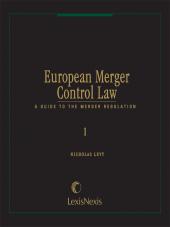EU Competition Law: Tools for Assessing Business Agreements
Select a format
 International Order Inquiry
International Order Inquiry
Select subscription type
Terms & conditions
Subscribers receive the product(s) listed on the Order Form and any Updates made available during the annual subscription period. Shipping and handling fees are not included in the annual price.
Subscribers are advised of the number of Updates that were made to the particular publication the prior year. The number of Updates may vary due to developments in the law and other publishing issues, but subscribers may use this as a rough estimate of future shipments. Subscribers may call Customer Support at 800-833-9844 for additional information.
Subscribers may cancel this subscription by: calling Customer Support at 800-833-9844; emailing customer.support@lexisnexis.com; or returning the invoice marked "CANCEL".
If subscribers cancel within 30 days after the product is ordered or received and return the product at their expense, then they will receive a full credit of the price for the annual subscription.
If subscribers cancel between 31 and 60 days after the invoice date and return the product at their expense, then they will receive a 5/6th credit of the price for the annual subscription. No credit will be given for cancellations more than 60 days after the invoice date. To receive any credit, subscriber must return all product(s) shipped during the year at their expense within the applicable cancellation period listed above.
The total price includes the product(s) listed in the Order Form and any Updates for a limited period (minimum period of 30 days) after the order is placed ("Order Window"). Shipping and handling fees are not included in the grand total price.
All shipments may be returned, at subscribers' expense, for full credit of the Price within 30 days of receipt.
Shipments may not be returned, and no credits will be issued, more than 30 days after receipt.
After the Order Window, subscribers will receive notice of Updates along with the then-current grand total price and order process as Updates become available. Subscribers will only be shipped those Updates they specifically request.
Product description
View a sample of this title using the ReadNow feature
Non-U.S. residents may contact a LexisNexis representative to order by calling +1 937.247.0293 or emailing inbound.sales@lexisnexis.com.
The goal of Tools for Assessing Business Agreements is to provide high-level practical and conceptual guidance and general training for use in understanding the concepts and protocols involved in vetting business agreements for EU competition law compliance. Tools for Assessing Business Agreements aims to demystify and facilitate application of the European Commission's various sets of guidelines and block exemption regulations.
Some topics in Tools for Assessing Business Agreements include: determining the relevant market; understanding and applying the concept of an "undertaking", examining EU competition law issues related to different categories of business agreements; understanding the EU antitrust "safe harbor" provisions, and evaluating key EU Commission Guidelines (e.g., Vertical Restraints Guidelines, Technology Transfer Guidelines, etc.) with regard to business agreements.
Tools for Assessing Business Agreements aims to provide a practically oriented frame of reference for reaching a working hypothesis on whether a business agreement reduces rivalry resulting in likely appreciable anticompetitive effects and, if so, whether those effects are outweighed by pro-competitive efficiency gains benefitting customers.
2024 Edition Highlights:
• New Commission Guidelines on Horizontal Cooperation Agreements
• Information Exchanges
• New R&D and Production BERs
This year’s edition covers and interprets important developments in 2023 relating to the European Commission’s new Guidelines on Horizontal Cooperation Agreements relating to the application of EU competition law to cooperation agreements between competitors. Drawing on the Commission’s decisional practice, EU Court case law and the views of stakeholders submitted in consultations as part of the adoption process, the new guidelines address the relevant factors and methodology for assessing horizontal cooperation agreements relating to: research and development (“R&D”); the manufacture of goods; the preparation of services for downstream provision to users; the joint purchase of inputs as distinguished from buyer cartels; the joint selling and marketing of competing products; the submission of joint bids in public or private procurement competitions; and the development and application of technical and quality standards, as well as standard terms and conditions of sale or purchase. The Commission’s new guidelines also provides important guidance on horizontal agreements that promote sustainable development.
Chapter 11 of this release explains and construes the Commission’s guidance on all of the above types of horizontal cooperation agreements. Among these updates, it includes a section elucidating the Commission’s important clarifications regarding the assessment of exchanges of commercially sensitive information between competitors in a variety of different situations, as well as a new Appendix aimed at facilitating the reader’s understanding of that guidance through a series of questions with YES or NO answers.
In parallel with its introduction of the new 2023 guidelines, the Commission also adopted new block exemption regulations (“BER”s) for R&D and production agreements between competitors. The new regulations, which entered into force in mid-2023, replace older block exemption regulations dating from 2010.
Chapter 9 of this release explains and interprets the updated requirements of these regulations, which allow agreements meeting their requirements to benefit from a presumption of compliance with EU competition law. One of the main requirements for this “safe harbor” coverage is that the competing parties to the agreements may not have a combined market share exceeding a certain prescribed level. In the case of the R&D block exemption regulation, the application of this requirement and its impact on the duration of safe harbor coverage varies according to the particular focus of the agreement, with several possible permutations. Chapter 9 aims to simplify the application in practice of this requirement to the different types of agreements with the assistance of an updated appendix with YES and NO answers to a series of questions. Chapter 9 also includes an updated interpretation of the application of the block exemption regulation applicable to production cooperation, also with the assistance of an updated appendix.
The second of the two main requirements for safe harbor coverage under the R&D and production block exemption regulations is that the agreements may not contain any listed “hardcore” restraints.
Chapter 8 of this release updates and elucidates the nature and understanding of the hardcore restraints preventing coverage by the safe harbors of the two new regulations. It also takes into account new case-law of the European Court of Justice on the relationship between the notions of restrictions of competition by object, which are presumed to produce appreciable anticompetitive effects in the form of higher prices or lower output, and hardcore restraints, which may restrict competition by object but require an assessment in individual cases to determine whether they do so.
The 2023 edition ISBN is 9781663360908.
eBooks, CDs, downloadable content, and software purchases are noncancelable, nonrefundable and nonreturnable. Click here for more information about LexisNexis eBooks. The eBook versions of this title may feature links to Lexis+® for further legal research options. A valid subscription to Lexis+® is required to access this content.
Table of contents
For full table of contents, click here.
 Lexis Nexis
Lexis Nexis 



